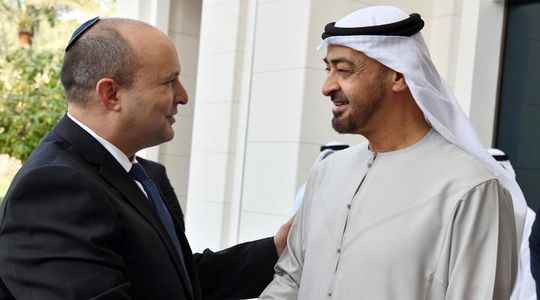A further step towards normalization between Israel and the Arab countries has been taken. The Jewish State and the United Arab Emirates, whose diplomatic relations had warmed up in 2020, signed a “historic” free trade agreement on Tuesday, May 31, the first of its kind. In concrete terms, customs barriers have been abolished for “96% of the products” exchanged between the two parties – particularly in the food, medical equipment and cosmetics sectors. In 2021, bilateral trade amounted to 900 million dollars (814.4 million euros), according to official Israeli data.
“Israel and the Emirates have signed a historic free trade agreement, the first of this magnitude between Israel and an Arab country,” Israeli Prime Minister Naftali Bennett said on Twitter. “Under the guidance of my friend Mohammed bin Zayed (Al-Nayane, ruler of the Emirates) and thanks to a lot of determination, this is the fastest signed free trade agreement in the history of Israel “, he continued. The New York Times pointed out that the speed of the agreement shows how some Arab countries now see the establishment of a Palestinian state as a “less immediate priority” than before, and are therefore more willing to accept Israel.
Economy Minister Orna Barvivai likened the deal to “a groundbreaking initiative” for Israel and for the UAE, while hoping it would serve as “an inspiration for the region”. If the agreement is historic, its signing is part of a series of rapprochement between the Arab world and Tel Aviv. The Emirates and Bahrain normalized relations with Israel in 2020 under a series of agreements negotiated with the United States. Morocco followed suit, while Sudan also agreed to normalize ties with Israel, although it has yet to finalize the deal. With a view to this free trade agreement, the talks began last November and were concluded in early April, after four negotiating sessions.
Dubai, future “hub for Israeli companies”
Economically, the trade agreement can pay off big: according to Dorian Barak, president of the Emirati-Israeli Business Council, nearly a thousand Israeli companies will have links with the Emirates by the end of the year. “Emirati-Israeli trade will exceed two billion dollars in 2022 and will reach around five billion dollars in five years, supported by collaboration in the renewable energy, consumer goods, tourism and life sciences sectors,” he indicated. “Dubai is becoming a hub for Israeli companies that see South Asia, the Middle East and the Far East as markets,” he added.
For the Ambassador of the Emirates to Israel, Mohamed Al-Khaja, the signing of this agreement is an “unprecedented success”. “Businesses in both countries will benefit from faster access to markets and lower tariffs as our nations work together to increase trade, create jobs…and strengthen cooperation,” he wrote on Twitter. Note that trade, tourism and investments have flourished since the signing of the Abraham Accords under the Trump administration, which also included Bahrain and later Sudan and Morocco, recalls the economic media. The Financial Times.
On the diplomatic side, this new “deal” makes it possible to reshuffle the cards between the different powers of the Middle East. The pact “with Israel will create a new paradigm for the region,” said Abdulla bin Touq, the UAE’s economy minister. With their Israeli partner, the Emirates are playing the balancing act: behind the official compassion for Palestine, Abu Dhabi shares the Jewish state’s concerns about the Iranian nuclear program and its interference in the Arab world.
Shared interests between Tel Aviv and Abu Dhabi
“The kingdom, in reality, never intended to weigh on Tel Aviv in the Israeli-Palestinian file. For a simple reason: it considers Hamas, the Muslim Brotherhood and political Islam as a common threat” , analyzed Andreas Krieg, lecturer at King’s College London, in L’Express, May 13, 2021.
Meanwhile, the UAE is concerned about the perceived US disengagement from the Middle East, pushing it towards new allies to diversify its security alliances. Especially since the region remains unstable, as the diplomat Robert Greenway recalled in the columns of L’Express on May 14: “In the coming year, or at least in the next two years, the Middle Orient is going through the most trying time in its history.”
The signing of this agreement comes in a tense context, two days after the “flag march”, a parade in the Old City of Jerusalem in which thousands of Israelis took part to commemorate the conquest of the eastern part of the city in 1967 and whose annexation has never been recognized by the international community. The march took place amid tensions between security forces, Israeli demonstrators and Palestinians, who view the annual procession as a provocation.
About 2,600 non-Muslims, tourists and Israelis, visited the Esplanade des Mosques, one of Islam’s holiest sites, on Sunday, a number far higher than usual. The Emirates “strongly condemned” this “assault” on Monday.
